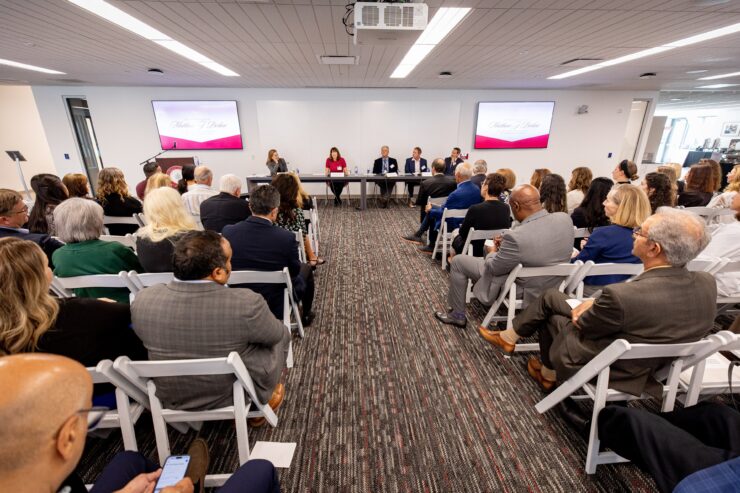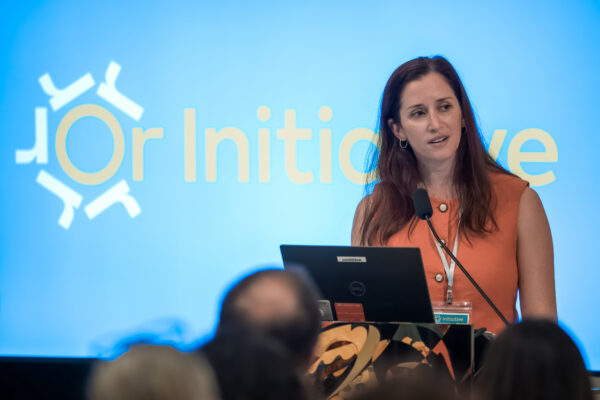As part of the inauguration week for Chapman University’s fourteenth president, Matt Parlow, the university hosted a series of events designed to highlight its priorities by showcasing student talent, advancing academic excellence, fostering interdisciplinary collaboration, and strengthening community engagement.
Nothing illustrated that interdisciplinary collaboration more than a panel at Chapman’s Rinker Health Science Campus in Irvine, where leading researchers and practitioners explored the lifelong effects of Adverse Childhood Experiences (ACEs), a critical issue in childhood health and development. The session was headlined by California Surgeon General Dr. Diana Ramos.
ACEs are traumatic events or environmental stressors that children experienced before the age of 18, including abuse (physical, emotional, or sexual), neglect, and household dysfunction such as parental substance use, mental health issues, or domestic instability.
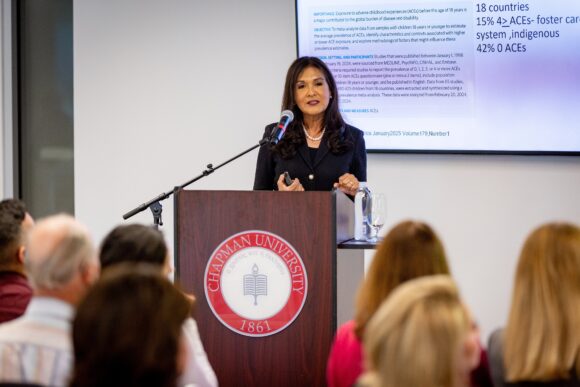
Dr. Ramos highlighted the profound and lasting impact of ACEs on brain development, behavior, and long-term health, emphasizing the importance of early intervention and supportive relationships. As she noted, “Your ACE score does not define your future.” She explained, “A child may simply be doing their best to survive now, with brain adaptations from the past,” underscoring the connection between early adversity and outcomes such as depression, asthma, obesity, and other chronic conditions. Addressing ACEs before adulthood can significantly improve lifelong health.
Speaking directly to students and researchers, she added, “You are leading the future of where research is going to be, where health is going to be, so thank you so much for that inspiration and the opportunity for students to be part of that.”
Each panelist shared insights from their respective fields, highlighting ongoing research and practical strategies for understanding and addressing the impacts of ACEs.
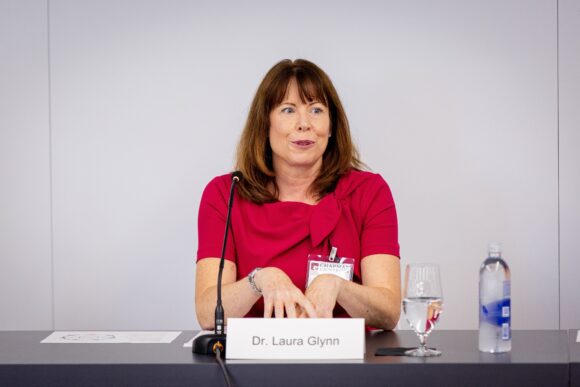
Dr. Laura Glynn, Professor of Psychology and Associate Dean of Research in Crean College at Chapman University, discussed how early life adversity shapes long-term mental and physical health outcomes. She outlined the origins and impact of ACEs, noting that two-thirds of Americans have experienced at least one, and that such exposures can predict lifelong challenges ranging from depression and addiction to chronic disease.
Glynn also shared her research on a newer area of study, “unpredictability” in a child’s home environment, which includes inconsistent routines, unstable finances, or frequent moves. Her team has found that unpredictability can disrupt brain development and increase risks for both mental and physical health issues, sometimes even more strongly than traditional ACEs. In collaboration with UCI and CHOC, her team has helped implement unpredictability screenings for more than 100,000 children in Orange County.
Glynn emphasized that these early challenges are not fate. “ACEs, including unpredictability, are not destiny. We have great opportunities for early intervention and prevention, and that’s where we’re all trying to move in that direction,” she said.
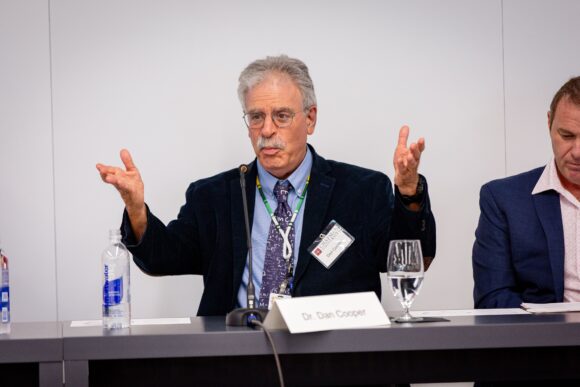
Dr. Dan Cooper, Distinguished Professor of Pediatrics at the UCI School of Medicine, discussed the biological and environmental links between childhood adversity, physical fitness, and lifelong health. He explained that childhood is a “critical period of growth and development” during which stress and unpredictability can alter hormone levels, stunt physical growth, and increase risk for chronic disease later in life.
Cooper’s research maps how environmental and socioeconomic disparities—such as limited access to safe play spaces—directly correlate with lower fitness levels in California schoolchildren. He is working to reinvigorate school-based physical fitness testing statewide and connect that data to pediatric care, giving doctors a clearer picture of children’s overall health.
“I think monitoring physical activity is really important, but it’s beyond that,” Cooper told the audience. “The test of physical fitness can be a learning experience and a positive experience for the child, the family, and the teacher.”
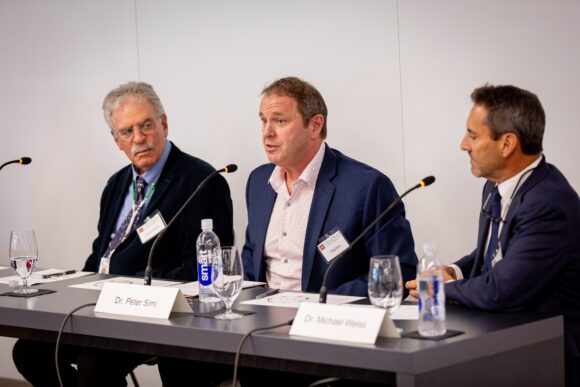
Dr. Pete Simi, Professor of Sociology at Chapman University, discussed how early trauma and ACEs can increase vulnerability to radicalization and political violence later in life. Drawing from more than 25 years of research, Simi explained that individuals who join extremist movements often have higher ACE scores than the general population, levels similar to those seen in incarcerated or high-risk youth populations.
He emphasized that while early trauma does not directly cause extremism, it can create instability that leaves individuals searching for meaning or belonging, gaps that extremist ideologies can exploit. Simi also warned that today’s online environments intensify these risks, exposing vulnerable young people to disinformation, predatory communities, and virtual forms of abuse.
“Cyberspace, online spaces, social media—it’s the Wild West right now, and the lack of regulation is staring us all in the face,” Simi said. “The things that are happening in these spaces are really quite outrageous, frankly, we’re not doing more to ensure greater safety, especially for most vulnerable children and others.”
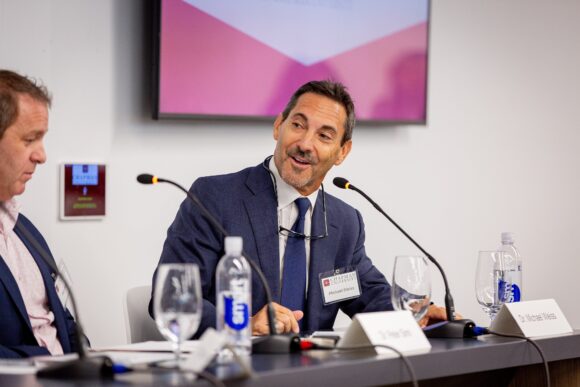
Dr. Michael Weiss, Vice President of Population Health at CHOC Children’s Hospital, described how translational science—turning research into practical solutions—is helping clinicians address the long-term health impacts of ACEs. Weiss oversees the CHOC Health Alliance, which coordinates care for more than 150,000 children across Orange County, and has led several state-funded ACEs Aware initiatives aimed at building a trauma-informed network of care.
He explained that while medical expertise is vital, “80% of what makes up our health has nothing to do with the ‘M.D.’ in front of our name—it’s about genetics, environment, habits, and zip code.” Weiss said CHOC’s ACEs work began with educating clinicians about trauma and has expanded to create “closed-loop” referral systems that ensure families actually receive the community-based support they’re referred to.
Now, he said, the focus is shifting from population-level data to individualized care, using scientific evidence to show that stable routines and predictability in children’s lives have measurable health benefits. Weiss and his team are working with the American Academy of Pediatrics to integrate these findings into national pediatric screening guidelines.
He closed by emphasizing the importance of connection and belonging, noting that kids who are connected to something—whether it’s sports, music, faith, or friendship—are kids who thrive. CHOC’s growing network of 70 “well-spaces” in schools gives students a place to calm down, practice mindfulness, and find that vital sense of connectedness.
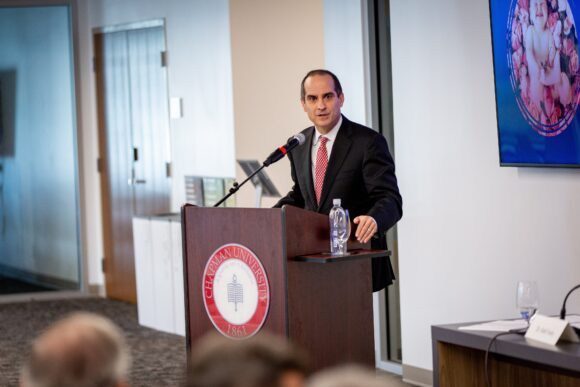
President Parlow thanked the panelists and the State Surgeon General for participating in this important conversation. “One of the focuses for my presidency is to do more interdisciplinary work,” Parlow said. “What we saw today shows that, because these are complex problems, and it takes science and health sciences and the social sciences and so many other disciplines to problem-solve these, it’ll take students graduating with interdisciplinary problem-solving skills who understand these different areas to help make society better.”
